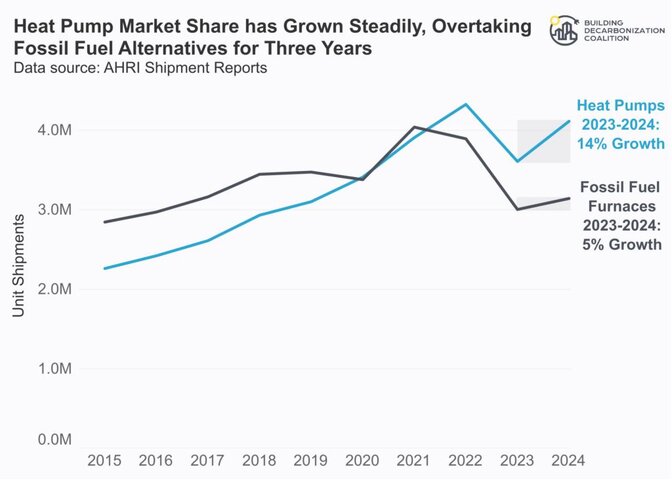Our friends at the Building Decarbonization Coalition have been publishing market trends about heat pumps for some time, including a quarterly Momentum Report. Those reports can be a bit techy and wordy, but they pack some really interesting insights that I wish more people knew about. So I thought it would be worth sharing some of them here in an easier-to-digest format.
“Heat pump sales have already surpassed gas furnaces, proving that all-electric comfort is becoming the new normal for U.S. homes.”
The big scoop (which few are aware of): Across the U.S., heat pump sales have surpassed gas furnaces, marking a major shift in how Americans heat and cool their homes. Heat pumps have been quietly leading the market since 2022, and now the trend is unmistakable. This year is shaping up to be the fourth in a row that U.S. manufacturers ship more energy efficient heat pumps than gas furnaces. This is a clear sign that homeowners want to replace their old oil and gas systems with modern, efficient, all-electric heat pumps.
We talk a lot about heat pumps here on the pages of The Switch Is On, and for good reason: there’s a lot to love! As more people become aware of their benefits, it’s no surprise that more homeowners want heat pumps.

This family enjoys quiet, efficient comfort from a modern ductless heat pump in the kids bedroom – proof that all-electric heating and cooling can be controlled room-by-room.
Why more U.S. homeowners are switching to heat pumps
One system for heating and cooling – how heat pumps work
A heat pump is an energy-efficient “two-in-one system” that provides both heating and cooling for your home from a single outdoor unit. If your AC is due for replacement or you want to add AC to your home, switching to a heat pump could cost about the same as a modern high-efficiency AC, except it also heats your home.
“Switching from oil or propane to a cold-climate heat pump cuts fossil fuel use by about 86 percent, saving households hundreds each year.”
Heat pumps work in cold climates – here’s proof
Fall is well on its way here in the Northeast where I live, and winter will once again bring bitter cold. Luckily, today’s cold-climate heat pumps keep homes cozy despite altitude and temp – even below 0°F – when sized and installed properly (which is why hiring a qualified local contractor is crucial). This is why adoption is growing in colder regions, too. A New York State Energy Research and Development Authority (NYSERDA) study found that switching from oil or gas to a cold-climate heat pump can cut fossil fuel use by around 86 percent and save households hundreds each year.
Save money and energy with modern heat pumps
Many states offer generous cash rebates for installing heat pumps (and if you rush, you could still get your federal tax credit if you switch before year-end!). Stacking federal, state, and local heat pump incentives helps lower upfront costs, while the energy-efficient operation of heat pumps keeps utility bills low year-round – especially in states like California, Colorado, and New York.
“Ninety percent of heat pump owners say they’d recommend them for year-round comfort, quiet operation, and cleaner indoor air.”
Year-round comfort and cleaner indoor air
Ninety percent of owners say they’d recommend heat pumps, citing year-round comfort, quiet operation, and cleaner indoor air. Satisfaction is consistent across New York, California, Colorado, and many more places where homeowners praise reliability in both hot and cold climates. Adoption is rising fast too—California installed over 150,000 systems in 2023, and Colorado saw a 40 percent jump in installations since 2022.
Contractors recommend heat pumps more than ever
Every day, more pros get qualified to install and service heat pumps – and they’re increasingly recommending heat pumps too. That means quotes are clearer, projects are faster, and the quality of installations is higher than ever.
“Studies show homes with heat pumps sell for up to seven percent more on average, adding as much as $17,000 in value.”
Heat pumps increase home value – here’s what studies show
As states across the country adopt clean energy goals and phase out gas and oil heating, homes with efficient all-electric systems like heat pumps are becoming more attractive to buyers and appraisers. And they’re willing to pay for it. According to a study from the University of Maryland and the University of Rhode Island, homes with air-source heat pumps sell for four to seven percent more on average, adding as much as $10,000 to $17,000 in value.

Heat pump sales have outpaced gas furnace sales nationwide for three straight years, signaling a shift toward clean, all-electric comfort in American homes. According to shipment data from the Air-Conditioning, Heating, and Refrigeration Institute, featured in the Building Decarbonization Coalition’s Momentum Q1 Report, heat pump shipments grew 14% from 2023 to 2024 — nearly triple the growth rate of fossil fuel furnaces. With adoption rising fastest in states like California, Colorado, and New York, more homeowners are replacing oil and gas systems with efficient heat pumps that deliver comfort, savings, and cleaner air year-round.
Your next air conditioner could be a heat pump
Nationwide shipment data from the Air Conditioning, Heating, and Refrigeration Institute (AHRI) – the industry’s leading source for HVAC equipment performance certification and shipment statistics – shows that the gap in sales between central ACs and heat pumps has narrowed sharply over the past decade. That means that when an AC fails or a new system is installed, more and more homeowners are opting for a heat pump instead of a like-for-like AC replacement. That makes a lot of sense as a future-proof move: You get year-round comfort without the need to invest in installing and maintaining separate systems for heating and cooling. If we look at the AHRI data, it’s clear that, if current trends continue, heat pump sales will outpace sales of AC units by 2029 – so your next AC could well be a heat pump!
Hot water is joining the party – heat pump water heaters are rising fast across the U.S.
Heat pump water heaters (HPWHs) sales are also rising fast across the U.S., helping homeowners reduce energy use and lower water heating costs. ENERGY STAR’s report of annual shipments shows a big jump in market share for HPWHs in 2023. Read this to learn about my own modest, but fun, contribution to this market trend. This trend also makes sense in light of the newer HPWH models that can work on a run-of-the-mill 120-volt plug found in every U.S. home, and often without an electrical panel upgrade. Regardless of what kind of water heater you have, if your tank is 10+ years old (as mine was), it could be nearing the end of its lifespan. Switching to a HPWH is a smart, energy-efficient replacement.

Electric water heaters have officially overtaken gas models in popularity, reflecting a nationwide shift toward efficient, all-electric home systems. According to shipment data from the Air-Conditioning, Heating, and Refrigeration Institute, residential electric storage water heater sales grew 11 percent between 2022 and 2024, compared to just one percent growth for gas models. This trend, highlighted in the Building Decarbonization Coalition’s Momentum Q1 Report, is strongest in states like California, Colorado, and New York, where homeowners are choosing cleaner, quieter, and more cost-effective technologies for everyday comfort and reliability.
Heat pumps aren’t just the future, they’re here now, with millions of U.S. households already making the switch. Between strong federal and state incentives, superior comfort, and lasting energy savings, there’s never been a better time to replace your old gas or oil furnace with an all-electric heat pump.
How to get started with a heat pump in your home
- Check for incentives: Find out what rebates are available in your area.
- Find a qualified expert: Pros can help you identify and install the best system for your home. Talk to contractors about your goals, and ask about potential savings, comfort upgrades, and indoor air quality improvements.
- Keep exploring: If you want to learn more about heat pumps, we have plenty more info on our blog.
This post adapts insights from BDC’s quarterly market brief. For the full data deep‑dive, see the Momentum Reports.